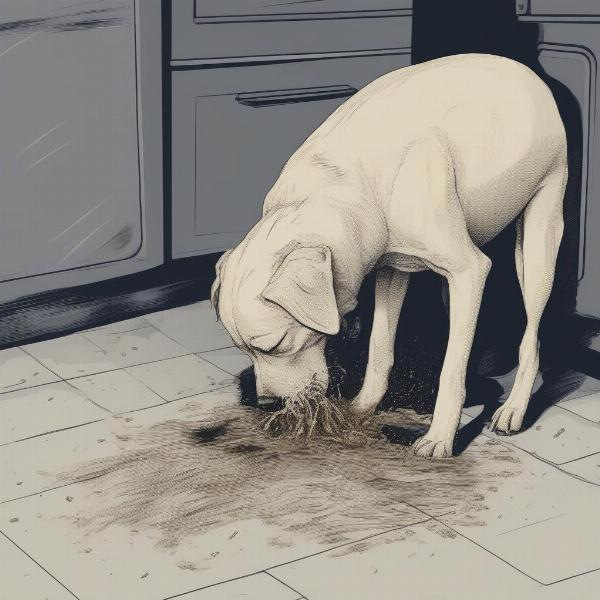Knowing which foods are toxic to dogs is crucial for every responsible pet owner. While some human foods are perfectly safe and even beneficial for dogs, others can cause serious illness and even death. This comprehensive guide will explore common foods toxic to dogs, helping you understand the risks and keep your canine companion safe and healthy. Having a readily available resource like a “foods toxic to dogs PDF” can be invaluable, but understanding the underlying principles is equally important.
Common Foods Toxic to Dogs
Many seemingly harmless foods can be dangerous for dogs. Their digestive systems process foods differently than ours, making them vulnerable to certain toxins. Here are some of the most common culprits:
- Chocolate: Contains theobromine, which is toxic to dogs. Darker chocolate has higher concentrations, making it more dangerous. Even small amounts can cause vomiting, diarrhea, tremors, and even seizures.
- Grapes and Raisins: The exact toxin is unknown, but even small quantities can cause kidney failure in dogs. Symptoms include vomiting, lethargy, and decreased urination.
- Xylitol: This artificial sweetener, found in many sugar-free products like gum and candy, can cause a rapid drop in blood sugar (hypoglycemia) in dogs, leading to weakness, seizures, and liver failure.
- Onions and Garlic: These contain compounds that damage red blood cells in dogs, causing anemia. Symptoms may include weakness, pale gums, and rapid breathing.
- Macadamia Nuts: While not as lethal as some other foods, macadamia nuts can cause weakness, tremors, vomiting, and hyperthermia in dogs.
- Avocado: Contains persin, which can cause vomiting and diarrhea in dogs. The pit and skin are particularly dangerous due to the higher concentration of persin.
Symptoms of Food Poisoning in Dogs
Recognizing the signs of food poisoning is essential for prompt treatment. If your dog exhibits any of these symptoms after consuming a potentially toxic food, contact your veterinarian immediately:
- Vomiting
- Diarrhea
- Lethargy
- Loss of appetite
- Tremors
- Seizures
- Difficulty breathing
- Pale gums
- Increased thirst or urination
- Abdominal pain
What to Do If Your Dog Eats Toxic Food
If you suspect your dog has ingested something toxic, act quickly. First, try to determine what and how much they ate. Contact your veterinarian or a pet poison control center immediately. They may advise you to induce vomiting or bring your dog in for treatment. Time is of the essence in these situations.
 Dog Vomiting After Eating Toxic Food
Dog Vomiting After Eating Toxic Food
Preventing Food-Related Accidents
The best way to protect your dog from food poisoning is to prevent exposure to toxic foods. Keep all potentially harmful foods out of reach, including in pantries and on countertops. Educate family members, especially children, about which foods are safe and unsafe for dogs. Be cautious when giving your dog table scraps, and stick to dog-friendly treats.
The Value of a “Foods Toxic to Dogs PDF”
Having a printable “foods toxic to dogs PDF” readily available can be an excellent resource for quick reference. It allows you to quickly check if a food is safe for your dog in case of an emergency. You can also share it with family members and pet sitters to ensure everyone is informed.
Conclusion
Protecting your dog from toxic foods is a crucial part of responsible pet ownership. By being aware of the common culprits, recognizing the symptoms of poisoning, and taking preventative measures, you can keep your furry friend safe and healthy. While a handy “foods toxic to dogs PDF” can be a valuable tool, understanding the underlying principles and acting quickly in case of ingestion are paramount.
FAQ
- What should I do if my dog eats chocolate? Contact your veterinarian or a pet poison control center immediately.
- Are all nuts bad for dogs? No, but some, like macadamia nuts, are toxic. It’s safest to avoid nuts altogether.
- Can I give my dog sugar-free gum? Absolutely not. Xylitol in sugar-free gum is extremely toxic to dogs.
- How much chocolate is toxic to a dog? Even small amounts, especially dark chocolate, can be dangerous.
- What are the signs of grape toxicity in dogs? Vomiting, lethargy, and decreased urination are common signs.
- Can dogs eat avocado? It’s best to avoid avocados due to the persin content, which can cause digestive upset.
- Where can I find a reliable “foods toxic to dogs PDF?” Consult your veterinarian or reputable online resources like ASPCA or AKC.
ILM Dog is your trusted partner in providing comprehensive information and resources for dog owners worldwide. We offer expert advice on everything from breed selection and puppy care to senior dog health and nutrition. Our mission is to empower dog owners with the knowledge and tools they need to provide their furry companions with the best possible care. For expert advice tailored to your dog’s needs, contact us via email at [email protected] or call us at +44 20-3965-8624. ILM Dog is here to support you every step of the way.